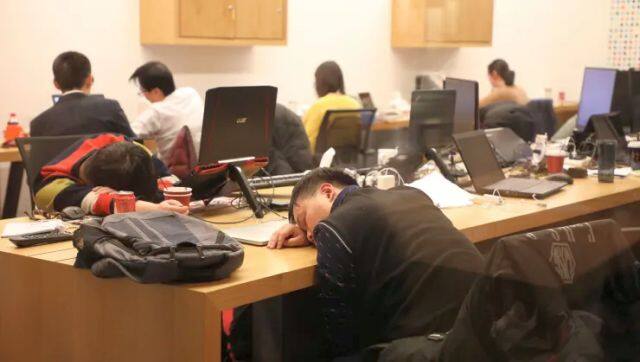It’s Monday morning. You have logged into work at 9 am and by 9.35 am, you have no tasks to do, and are looking at the watch waiting for the time you can log out. If this sounds like you at work, chances are you are suffering from a rust out. No, it’s not when you start oxidising (if that’s even possible), but it’s a new workplace trend that is catching on among employees and in fact, has become the happening label of 2023. This new trend joins other famous workplace trends such as the Great Resignation of 2021 where millions of employees around the world quit due to drastic post-pandemic changes in workplace rules. And then there was quiet quitting and
quiet firing
— with the former referring to the practice of doing just the bare minimum requirement as dissatisfaction festers while the latter describes the act of edging an employee out of a company by worsening their dissatisfaction. There was also
Bare Minimum Monday
in which employees take it easy at the state of the work week and ease back into work tasks rather than diving in. Let’s take a closer look at rust out and what can be done to counter it. Left out to rust When an employee rusts out, it means that he or she has become bored in the workplace, ultimately becoming depressed and apathetic. Some experts call it the lesser-known cousin to burnout. The term is used to define the feeling between boredom and
burnout
and it is when an employee is fed up about how they are being treated within the job, rather than the role. Professor of occupational therapy and author of author of Challenging Stress, Burnout and Rust-Out, Teena Clouston summed it up to Cosmopolitan perfectly. “Rust-out is a lot deeper and more profound than boredom. “It’s where people don’t feel they’re don’t anything purposeful or being recognised. They often feel blocked — as if there’s nowhere for them to progress to, and it can be a much harder issue to address than burnout.” Psychotherapist Paula Coles explains rust out further in a report published by Happiful. “Rusting out is when work is uninspiring and fails to stretch the person, so that they become disinterested, apathetic, and alienated.”
Also read: Work From Hell: Which type of job makes people the unhappiest?
When an employee is in a role that provides them with the right level of immersion and stimulation, the phenomenon is call flow — where the challenge of the work aligns with the capability of the employee. Burnout is when the demands of the role exceed the time, ability and resources. And then there is rust out which is when the demands of the role are lower than the worker’s skills and ability, leading to boredom and frustration. And if you thought that rust out is a minor problem, affecting just a few people — think again. Analytics firm Gallup’s global workplace report for 2022 found that a mere 21 per cent of people felt engaged at work. In Europe, the region with the lowest percentage of engaged employees, 60 per cent felt detached from their jobs and 19 per cent felt miserable. This highlights that a majority of the workforce is rusting out or on the verge of a rust out, which is detrimental to productivity. Experts have also found that rust out is more likely to affect women than men. [caption id=“attachment_12405552” align=“alignnone” width=“640”] Rust out occurs more in women than in men at the workplace, say experts. Image used for representational purposes/Pixabay[/caption] Causes for rusting out There can be various reasons for an employee to experience a rust out at work. It usually happens when you work in a job that you’re overqualified for. Despite your experiences and expertise, your manager assigns you menial tasks that even a junior-level employee can carry out. Your ideas are shot down and you always come up short. You feel under-challenged and you lose a sense of purpose for your work. In some unique cases, a rust out could take place due to quiet firing. Remember that workplace trend when management intentionally made an employee go through a rough patch so as to force them to quit. Now, you could be experiencing a rust out owing to your manager’s efforts at quiet firing. Effects of a rust out So, what exactly happens when a worker starts to feel a rust out at work? In a rust out, an employee slowly loses a sense of meaning or purpose in the work they are doing. An employee who is witnessing a rust out no longer feels interested in going the extra mile to deliver or impress management. It goes well beyond being bored and can be mentally as well as physically detrimental to an employee. Clouston explains, “The mental impact of a rust out can be quite dark. You can feel depressed — like you’re stuck in the mud, unable to move.” It can lead to
depression
, sleepiness, cravings for sugary or fatty foods, and an increase in risk-taking behaviours. While the effects of a rust out would be first felt by an employee, its ramifications are far–reaching. A worker who is experiencing a rust out will have poor work productivity, increased sickness, absenteeism, work errors, and even work-related accidents.
Also read: Doesn’t Pay To Be Smart: Why the most intelligent don’t earn the most
Clouston further adds, “As a general rule, once someone starts to rust out, the quality of work goes downhill, as the employee loses interest, finding the job unfulfilling. This leads to cynicism.” [caption id=“attachment_12405572” align=“alignnone” width=“640”]
Rust out occurs more in women than in men at the workplace, say experts. Image used for representational purposes/Pixabay[/caption] Causes for rusting out There can be various reasons for an employee to experience a rust out at work. It usually happens when you work in a job that you’re overqualified for. Despite your experiences and expertise, your manager assigns you menial tasks that even a junior-level employee can carry out. Your ideas are shot down and you always come up short. You feel under-challenged and you lose a sense of purpose for your work. In some unique cases, a rust out could take place due to quiet firing. Remember that workplace trend when management intentionally made an employee go through a rough patch so as to force them to quit. Now, you could be experiencing a rust out owing to your manager’s efforts at quiet firing. Effects of a rust out So, what exactly happens when a worker starts to feel a rust out at work? In a rust out, an employee slowly loses a sense of meaning or purpose in the work they are doing. An employee who is witnessing a rust out no longer feels interested in going the extra mile to deliver or impress management. It goes well beyond being bored and can be mentally as well as physically detrimental to an employee. Clouston explains, “The mental impact of a rust out can be quite dark. You can feel depressed — like you’re stuck in the mud, unable to move.” It can lead to
depression
, sleepiness, cravings for sugary or fatty foods, and an increase in risk-taking behaviours. While the effects of a rust out would be first felt by an employee, its ramifications are far–reaching. A worker who is experiencing a rust out will have poor work productivity, increased sickness, absenteeism, work errors, and even work-related accidents.
Also read: Doesn’t Pay To Be Smart: Why the most intelligent don’t earn the most
Clouston further adds, “As a general rule, once someone starts to rust out, the quality of work goes downhill, as the employee loses interest, finding the job unfulfilling. This leads to cynicism.” [caption id=“attachment_12405572” align=“alignnone” width=“640”] A rust out at work affects productivity and makes an employee cynical and unhappy to the point of quitting. Image used for representational purposes/AFP[/caption] Fight against rust out However, before you press the panic button over a rust out, wait. It’s not a permanent situation and can be resolved. Chartered psychologist Audrey Tang, a specialist in workplace wellbeing and author of The Leader’s Guide To Resilience, believes that a rust out is at its core an organisational issue. Speaking to Cosmopolitan, she said, “The person rusting has been left by a careless manager.” She adds that it is vital for companies to be more aware of rust out and to counter it by identifying their employees’ worth and providing them with work that will make them feel recognised and valued. Christopher Combs, PhD, associate professor of clinical psychiatry and behavioural science at Temple University’s Lewis Katz School of Medicine in Philadelphia, is of the opinion that employees should also take steps on their own to reignite their professional fire. Speaking to WebMd, he said, “Take a course, either through your company or on your own, can also reset your motivation. If you feel like you’re stuck, further develop your skill set. This could also help you find another job if you choose to make a fresh start.” Some other experts note that an employee feeling a rust out should take a breather or go on a vacation to refresh their mind, and seek some clarity. Seeking an activity outside of work of pursuing a hobby more aggressively could also help in dealing with feelings of a rust out. If none of this helps, start looking for a new job. After all, the German has that old saying — “He who rests, rusts.” With inputs from agencies Read all the
Latest News
,
Trending News
,
Cricket News
,
Bollywood News
, India News
and
Entertainment News
here. Follow us on
Facebook
,
Twitter
and
Instagram
.
A rust out at work affects productivity and makes an employee cynical and unhappy to the point of quitting. Image used for representational purposes/AFP[/caption] Fight against rust out However, before you press the panic button over a rust out, wait. It’s not a permanent situation and can be resolved. Chartered psychologist Audrey Tang, a specialist in workplace wellbeing and author of The Leader’s Guide To Resilience, believes that a rust out is at its core an organisational issue. Speaking to Cosmopolitan, she said, “The person rusting has been left by a careless manager.” She adds that it is vital for companies to be more aware of rust out and to counter it by identifying their employees’ worth and providing them with work that will make them feel recognised and valued. Christopher Combs, PhD, associate professor of clinical psychiatry and behavioural science at Temple University’s Lewis Katz School of Medicine in Philadelphia, is of the opinion that employees should also take steps on their own to reignite their professional fire. Speaking to WebMd, he said, “Take a course, either through your company or on your own, can also reset your motivation. If you feel like you’re stuck, further develop your skill set. This could also help you find another job if you choose to make a fresh start.” Some other experts note that an employee feeling a rust out should take a breather or go on a vacation to refresh their mind, and seek some clarity. Seeking an activity outside of work of pursuing a hobby more aggressively could also help in dealing with feelings of a rust out. If none of this helps, start looking for a new job. After all, the German has that old saying — “He who rests, rusts.” With inputs from agencies Read all the
Latest News
,
Trending News
,
Cricket News
,
Bollywood News
, India News
and
Entertainment News
here. Follow us on
Facebook
,
Twitter
and
Instagram
.
Roshneesh is on the Explainers team and loves her job. Apart from the everyday 'explaining', she enjoys tennis and is a Rafa fan for life. She is also a Potterhead.
)